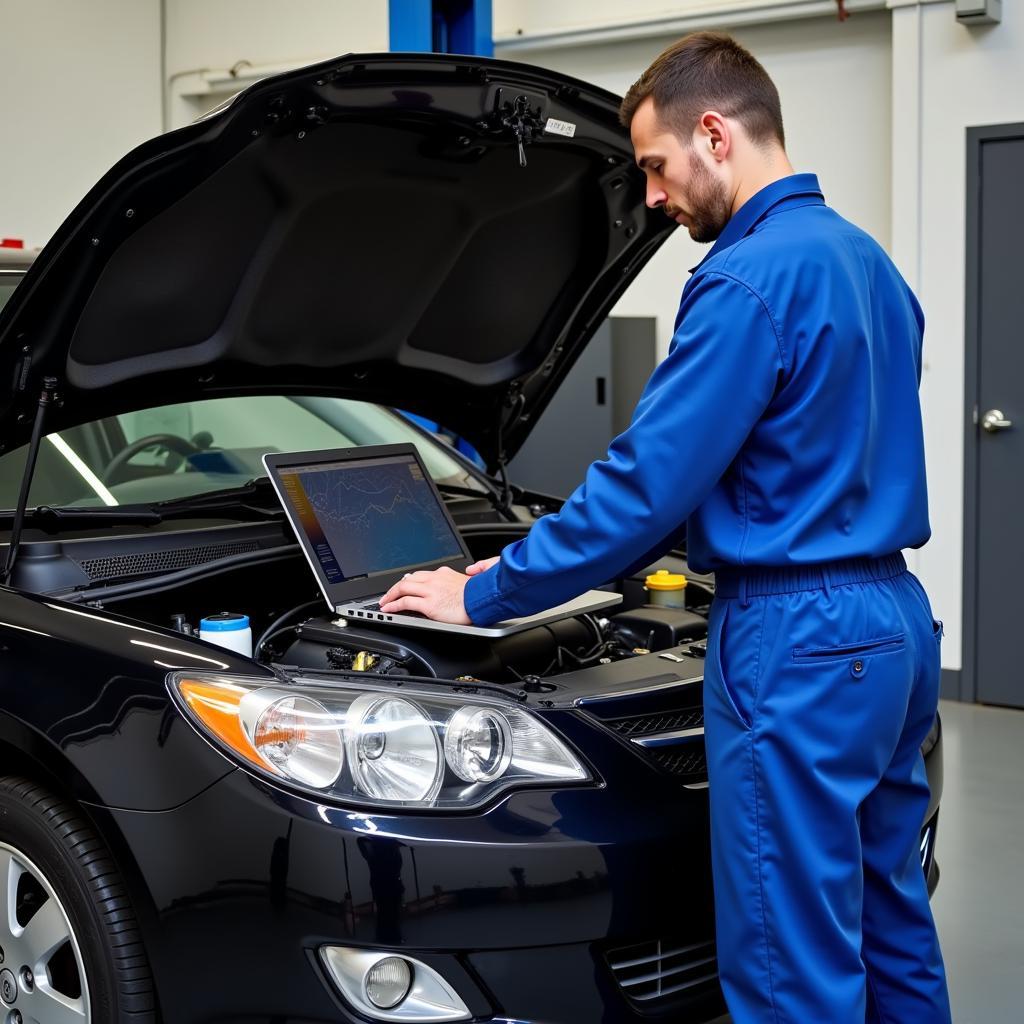The demand for skilled car diagnostic technicians is on the rise as vehicles become increasingly complex. If you have a passion for cars and a knack for problem-solving, enrolling in car diagnostic technician courses can be your gateway to a rewarding career in the automotive industry. This article will guide you through everything you need to know about car diagnostic technician courses, from the skills you’ll learn to the career paths you can pursue.
 Car Diagnostic Technician Using Laptop
Car Diagnostic Technician Using Laptop
Understanding the Role of a Car Diagnostic Technician
Car diagnostic technicians are the detectives of the automotive world. They are responsible for identifying and troubleshooting issues in modern vehicles using advanced diagnostic equipment and their in-depth knowledge of automotive systems. Their work goes beyond simply changing oil or replacing tires; they delve into the intricate network of electronics and computer systems that control today’s cars.
Key Responsibilities of a Car Diagnostic Technician:
- Vehicle Inspections: Conducting thorough inspections of vehicles to identify potential problems.
- Diagnostic Testing: Using specialized equipment to run diagnostic tests and pinpoint the root cause of issues.
- Troubleshooting: Analyzing data retrieved from diagnostic tests to determine the most effective repair strategy.
- Repair and Maintenance: Performing repairs and maintenance on various vehicle systems, including engine, transmission, brakes, and electrical systems.
- Technical Expertise: Staying updated on the latest automotive technologies and diagnostic procedures.
What to Expect in Car Diagnostic Technician Courses
Car diagnostic technician courses provide comprehensive training that equips students with the knowledge and skills to excel in this field. car diagnostics course curriculums typically combine classroom instruction with hands-on practical experience, covering a wide range of topics, including:
- Automotive Fundamentals: Understanding the basics of engines, transmissions, brakes, steering, and suspension systems.
- Electronics and Electrical Systems: Gaining proficiency in diagnosing and repairing complex electronic control units (ECUs), sensors, wiring harnesses, and other electrical components.
- Diagnostic Equipment: Learning to operate and interpret results from various diagnostic tools such as OBD-II scanners, multimeters, oscilloscopes, and pressure gauges.
- Troubleshooting Techniques: Mastering systematic approaches to identify and resolve issues in various vehicle systems.
- Software and Technology: Familiarizing yourself with automotive software applications used for diagnostics, programming, and data analysis.
Choosing the Right Car Diagnostic Technician Course
When selecting a car diagnostics learning course, consider the following factors:
- Accreditation and Reputation: Opt for programs accredited by recognized automotive organizations like the National Automotive Technicians Education Foundation (NATEF) or Automotive Service Excellence (ASE).
- Curriculum and Specializations: Evaluate the course curriculum to ensure it aligns with your career goals and interests. Some programs may offer specializations in specific areas like car electronics diagnostic technician courses.
- Faculty and Industry Connections: Research the experience and qualifications of the instructors. Programs with strong industry connections often provide better job placement opportunities.
- Hands-on Experience: Prioritize courses that emphasize practical application through workshop sessions and internships.
- Facilities and Equipment: Ensure the program has access to modern diagnostic equipment and facilities comparable to those used in the industry.
Career Paths for Car Diagnostic Technicians
Completing car diagnostic technician courses opens doors to various career opportunities in the automotive industry:
- Automotive Technician: Starting as an entry-level technician and progressing to specialized roles like master technicians.
- Service Advisor: Leveraging technical knowledge to advise customers on repair options and maintenance needs.
- Shop Foreman or Manager: Supervising and managing a team of technicians in an automotive repair shop.
- Mobile Diagnostic Technician: Providing on-site diagnostic services to customers at their locations.
- Technical Support Specialist: Offering technical assistance to other technicians or customers over the phone or online.
Embracing the Future of Car Diagnostics
As technology continues to advance, car diagnostic technicians need to stay ahead of the curve. The rise of electric vehicles (EVs), autonomous driving features, and connected car technologies demands continuous learning and adaptation. Embracing these advancements will be crucial for success in this rapidly evolving field.
Conclusion
Car diagnostic technician courses offer a pathway to a challenging and rewarding career in the automotive industry. By gaining the necessary skills and knowledge, you can become an indispensable asset in this in-demand profession. Car diagnostic training courses provide a solid foundation for a fulfilling career path, allowing you to turn your passion for cars into a thriving profession.
FAQs about Car Diagnostic Technician Courses
1. What is the average salary of a car diagnostic technician?
The salary of a car diagnostic technician can vary based on experience, location, and certifications. However, the average annual salary ranges from $40,000 to $70,000.
2. How long does it take to complete a car diagnostic technician course?
The duration of car diagnostic technician courses can vary depending on the program’s intensity and whether it’s a certificate, diploma, or associate degree program. Typically, programs range from six months to two years.
3. Do I need prior automotive experience to enroll in these courses?
While prior experience is beneficial, it’s not always mandatory. Many car diagnostic technician courses cater to beginners and provide foundational knowledge.
4. What are the essential soft skills for car diagnostic technicians?
Apart from technical expertise, strong problem-solving skills, attention to detail, effective communication, and teamwork are crucial for success in this role.
5. What are the career advancement opportunities in car diagnostics?
With experience and additional certifications, car diagnostic technicians can advance to master technician roles, management positions, or even specialize in emerging automotive technologies like EVs or autonomous vehicles.
6. How can I find reputable car diagnostic technician courses near me?
You can search online for accredited programs, contact local automotive repair shops for recommendations, or inquire with automotive trade schools and community colleges.
7. Is it worth investing in car diagnostic software for laptop?
Investing in quality diagnostic software can be highly beneficial for aspiring technicians, as it provides access to advanced features, data analysis capabilities, and the latest vehicle information.
Need Help? Contact Us!
For further assistance with car diagnostics and training resources, don’t hesitate to contact our team of experts. We are available 24/7 via WhatsApp: +1(641)206-8880 or Email: [email protected].

